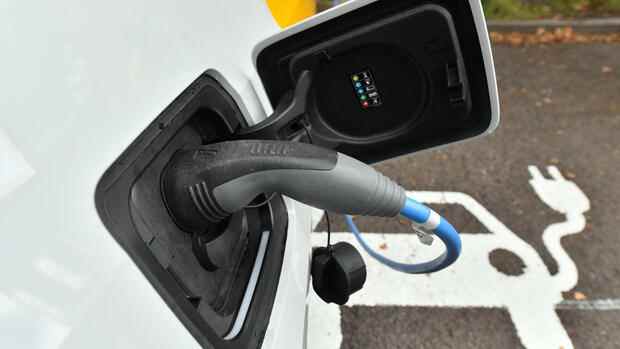So far, maintenance costs for e-cars have been superior to combustion engines. But that is changing.
(Photo: dpa)
Vienna Although they are expensive to buy, they are cheap to operate: This equation has previously applied to electric cars. If all costs are taken into account – from the purchase price and insurance, to expenses for energy, inspection and maintenance, to depreciation after five years -, according to ADAC, electric cars in Germany perform many times better than combustion engines with equivalent equipment and performance.
For example, the ID.3 beats the VW Golf in a full cost calculation just as clearly as the Mercedes EQA beats its combustion engine counterpart, the GLA. But the ratio of electric vehicles to diesel vehicles and petrol engines is likely to reverse soon. This is what the Center Automotive Research (CAR) predicts in a new analysis that the Handelsblatt was able to view in advance.
“From 2023, electric cars will be at a significant cost disadvantage for consumers in Germany,” states CAR Director Ferdinand Dudenhöffer. With a sober calculation, battery-electric models would hardly be profitable due to the lack of subsidies and the rapidly increasing electricity prices. This reduces the attractiveness of electric cars and will result in a “significant purchase blockade”, sums up the industry expert.
For his analysis, Dudenhöffer compared three popular electric cars in terms of their total costs minus discounts and a mileage of 15,000 kilometers per year with equivalent combustion models. Specifically, the complete monthly costs of the Fiat 500e and the Opel Mokka-e were compared with those of their respective combustion engine twins.
Top jobs of the day
Find the best jobs now and
be notified by email.
There is also a comparison of the Tesla Model 3 with the BMW 3 Series. The latter was selected because, as is well known, Tesla only has battery-electric models in its portfolio, so a direct comparison between electric and petrol models is not possible here.
High electricity prices make electric cars less profitable
On average across all three purely electric brands, the CAR Institute calculates monthly expenses of 596 euros for 2022 in the base scenario. Of this, 67 euros are accounted for by the electricity bill at an assumed price of 32 cents per kilowatt hour.
In contrast, the three combustion models have an average monthly full cost of 631 euros, of which 142 euros are attributable to the petrol bill. Here, a fuel price of 1.87 euros was chosen as a reference. All in all, the purely electric brands currently have a cost advantage of 36 euros, according to Dudenhöffer. Even with a fuel price of 1.55 euros, the Stromer would be more attractive. His conclusion: “Electromobility works under these conditions.”
In the study, the electric car was compared with its combustion engine twin.
(Photo: IMAGO/PanoramaC)
However, according to the Federal Association of Energy and Water Management, the electricity price for an average household in Germany was recently more than 37 cents per kilowatt hour. And many tariff increases by public utilities and other energy suppliers are yet to come into force. In short: the tripling of the wholesale electricity price within a year has by no means reached all consumers.
In a medium scenario, which is classified as rather realistic, the CAR Institute is therefore assuming an electricity price of a good 50 cents per kilowatt hour. Anyone who finds such conditions at home at the wall box would be two euros cheaper per month with a new petrol engine this year than with a new all-electric car, according to the experts.
>> Read here: Tesla is catching up, Fiat stays ahead – the ten most popular electric cars in 2022
In 2023, the business case for Stromer should finally tip over. The lowering of the environmental premium from 9,000 to 6,750 euros for vehicles below a list price of 40,000 euros and the reduction in funding from 7,500 to 4,500 euros for vehicles up to a list price of 65,000 euros “nullify” the cost advantages of electric cars in all scenarios, they write Authors of the CAR analysis.
Many wait before buying an electric car
Even assuming an electricity price of 32 cents per kilowatt hour, many fully electric new cars would counteract a monthly cost disadvantage of 34 euros in relation to similar combustion engines. With an electricity price of 50 cents, the disadvantage increases to 71 euros. And if you fill up your electric car mainly at fast charging stations and thus have higher electricity costs, you have to reckon with additional monthly costs of a total of 123 euros compared to petrol vehicles.
“The prospects for electromobility under the Green Economics Minister Robert Habeck and the traffic light government in Berlin are poor,” states Dudenhöffer. Especially those who are toying with the idea of buying an electric car for the first time should pay particular attention to the costs. In view of the foreseeable additional costs, many consumers are likely to either opt for a petrol engine one last time or postpone the purchase of a battery vehicle.
More: “If you’re not in China, you won’t be in the car business” – Opel still cancels expansion plans to the Far East
